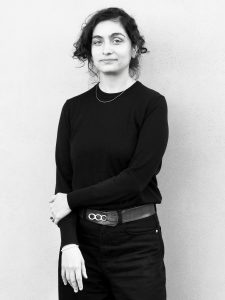Mariam Gegidze

Shortbio
- Since 2021 Research Associate, DFG Research Training Group 2227 “Identity and Heritage,” TU Berlin
- Since 2020 Co-founder and Editor, “Tbilisi Architecture Archive” (TAA)
- 2017-2021 Editor, BauNetz, Berlin
- 2015 Editorial and Curatorial Assistant for “Dialogic City – Berlin wird Berlin,” Brandlhuber+ Hertweck, Mayfried, Berlin/Versailles
- 2014-2015 Project Assistent “Post-Oil City. The History of the City’s Future – ქალაქი ნავთობის შემდეგ. ქალაქის მომავლის ისტორია”, ARCH+, ifa, Tbilisi
- 2009-2014 Study of Cultural Studies, Humboldt University of Berlin
- 2012-2013 Editorial Assistant, ARCH+ Berlin
- 2002-2007 Study of Architecture, State Academy of Arts, Tbilisi
Contact
Technische Universität Berlin
Fakultät VI – Planen Bauen Umwelt
Institut für Stadt- und Regionalplanung
Fachgebiet Denkmalpflege
DFG-Graduiertenkolleg 2227 „Identität und Erbe“
D-10623 Berlin
m.gegidze@tu-berlin.de
Laguna Vere – Swimming in Archives. Practices of Archiving and Activating Architectural Documents (Working Title)
Whether sketches or notes, plans, photos, or models—architectural documents can be archived and later reactivated. The research deals with alternative methods of collecting and presenting architecture, questioning the equality of ‘non-classical’ with ‘typical’ architectural documents. Integrating new documents into archival collections implies the development of alternative ways of finding, seeing, and hearing. Only through these approaches, the thesis argues, can previously marginalized actors, overlooked narratives, and the intertwined, multi-layered aspects of architecture become accessible and easier to find.
The question of what constitutes a document of architecture and when it is considered ‘valuable’ and ‘worthy of archiving’ because it serves as a source is explored in this work through the examination of the Laguna Vere swimming pool complex in Tbilisi, which was constructed between 1964 and 1978. The long, obstacle-filled planning history of this building complex points to direct connections between architectural production, historical events, and regional conflicts. The extraordinary history of its use, the immense significance of the swimming pool complex, its current condition, and the diversity of available documents brings this case study into focus for examining broader questions.
The central research question is also an approach: What implicit knowledge do alternative architectural documents contain, and how can these be activated? Is it possible, through the accessibility and dissemination of these documents, to uncover new narratives, connections, and perspectives that help us understand the past and orient ourselves toward the future? Questions of this kind will be explored in the work through a multidimensional archival investigation using a case study.
Publications
Edited Volumes
- J. Vogl, A. Dinççağ Kahveci, M. Gegidze, P. Santacana López (Hgg.): Dinge, die Verbinden. Band V Schriftenreihe des Grk Identität und Erbe, 2024.
- M. Gegidze, Tbilisi Architecture Archive (Hgg.): Laguna Vere. Tbilisi 2022.
Selected Articles
- M. Gegidze: For a moratorium on Laguna Vere and its surrounding area! Open Letter to Tbilisi City Hall Tbilisi Architecture Archive 15.04.2024.
- M. Gegidze: Unpacking Soviet architecture collections: Tbilisi Architecture Archive, in: Jaap Bakema Study Centre (Hg.): Architecture Archives of the Future, Delft/Rotterdam 2023.
- M. Gegidze, N. Tchatchkhiani, N. Abasashvili: Tbilisi Architecture Archive, in: Tbilisi Architecture Biennial (Hg.): What do we have in common. Tbilisi 2022.
- M. Gegidze: Vernetzte Schweiz, in: BauNetzWoche592 2022.
- M. Gegidze: Queernees im öffentlichen Raum. Poligonal vermitteln Erfahrungen marginalisierter Grippen, in: BauNetzWoche#569 2021.
- M. Gegidze: Architektur im Archiv. Vom Sammeln, Kuratieren und Digitalisieren, in: BauNetzWoche#558, 2020.
- M. Gegidze: Initiative Gewinnt. Eliso Sulakauri, in: BauNetzWoche#549, 2020.
- M. Gegidze: Wer hat Angst vor(m) Biest? Ein Künstlerduo aus Berlin entwirft flüchtige Raumkonstellationen für ein nomadisches Zeitalter, in: BauNetzWoche#500, 2017.
- M. Gegidze, D. Manjavdize, N. Opel: Alles was nicht verboten ist, ist erlaubt / Everything not forbidden is allowed. In: ARCH+ 224, 2016; Everything not forbidden is allowed / ყველაფერი რაც აკრძალული არ არისდასაშვებია, in: Danarti 8, 2018.
- M. Gegidze, T. Hönig: … lebt und arbeitet in Berlin, in: Brandlhuber, A., Hertweck, F. Mayfried, T. (Hgg) The Dialogic city — Berlin wird Berlin. Köln 2015; eine Bearbeitete Version in: R. Riewe, S.C. Radulescu, A. Stocker (Hgg): Learning from Berlin. Die Großstruktur als urbaner Generator. Graz 2018.
- L. Bakradze, M. Gegidze, N. Tchatchkhiani: Glossary. in: Post-Oil City. The History of the City`s Future Tbilisi 2015.
- M. Gegidze, D. Spruth: Auf der Suche nach dem großen Wurm, in: ARCH+ 209, 2012.
- M. Gegidze, A.L. Ngo, D. Spruth: Moskau–Berlin—London, in: ARCH+ 209, 2012.
Other Activities
- 2022, Exhibition curation “Laguna Vere”, MAUDI, Tbilisi
- 2021, Co-creation of architectural routes and audio tracks, “Werner Düttmann: Berlin. Building. Werk.”, with Poligonal. Büro für Stadtvermittlung, Berlin
- 2020, Co-conception of the Tbilisi Architecture Biennial “What do we have in Common”